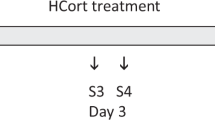Summary
Mifepriston (RU 486) is a steroid antagonist which binds with high affinity to glucocorticoid receptors (GR), and also to progesterone receptors. The antiglucocorticoid action of Mifepriston in man has been demonstrated by blockade of the negative feedback action of endogenous cortisol and by antagonism of the effects of exogenously aministered dexamethasone. In the present study Mifepriston was administered to a normal male volunteer at 14.00 h and its effects on pituitary-adrenal activity and nocturnal sleep pattern were recorded. Mifepriston caused a large rise in plasma ACTH levels during the morning hours in comparison to untreated male control subjects. Plasma ACTH levels in the Mifepriston treated subject at 7.00 h were threefold greater than in the control subjects (104.4 pg/ml vs. 37.6±13.9 pg/ml;\(\bar x\)±SD). Subsequently the cortisol secretion was enhanced and the rise was advanced by about 60 minutes compared to controls. The main effects of Mifepriston on EEG sleep pattern were a dramatic disruption of sleep quality with a prolonged sleep onset latency, increased nocturnal awakenings and a considerable reduction of both slow wave sleep (SWS) and REM sleep. After Mifepriston, SWS was reduced by about 80% in comparison to placebo, and REM sleep was reduced by more than 50%. While the present data were collected from only a single subject the effects observed were so pronounced that tentative conclusions seem to be justified: The well-established pharmacological properties of Mifepriston as a glucocorticoid antagonist are reflected by its action on sleep physiology since it influences sleep in a direction opposite to that produced by cortisol. This observation further substantiates the view that changes in SWS and REM sleep may be mediated by GR effects.
Similar content being viewed by others
References
Bardeleben U von, Lauer C, Wiedemann K, Holsboer F (1988): Nocturnal sleep-endocrine effects of cortisol infusion in normal controls. Neuroendocrine Letters 10, 227
Bertagna X, Bertagna C, Luton J, Girard F (1984): The new steroid analog RU 486 inhibits glucocorticoid action in man. J Clin Endocrinol Metab 59, 25–33
Born J, Zwick A, Roth G, Fehm-Wolfsdorf G, Fehm HL (1987): Differential effect of hydrocortisone, fluorcortolone, and aldosterone on nocturnal sleep in humans. Acta Endocrinologica 116, 129–137
Born J, DeKloet ER, Wenz H, Kern W, Fehm HL (1991) Gluco- and antimineralocorticoid effects on human sleep: A role of central corticosteroid receptors. Am J Physiology 260, 183–188
Clore JN, Hershel E, Ross-Clunis H, Watlington CO (1988): Adrenocorticotropin and cortisol-induced changes in urinary sodium and potassium excretion in man: effects of Spironolactone and RU 486. J Clin Endocrinology and Metabolism 67, 824–831
DeKloet ER (1991): Brain Corticosteroid receptor balance and homeostatic control.Frontiers in Neuroendocrinology 12, 95–163
Gaillard RC, Riondel A, Muller MF, Herrman W, Beaulieu EE (1984): RU 486: a steroid with antiglucocorticosteroid activity that only disinhibits the human pituitary-adrenal system at a specific time of day. Proc Natl Acad Sci USA 81, 3879–3884
Joëls M, DeKloet ER (1990) Mineralocorticoid receptor-mediated changes in membrane properties of rat CA1 pyramidal neurons in vitro. Proc Natl Acad Sci USA 87, 4495–4498
Joëls M, DeKloet ER (1992): Control of neuronal excitability by corticosteroid hormones. TINS 15, 25–30
Kling MA, Whitfield Jr HJ, Brand HA, Demitrack MA, Kalogeras K, Geracioti TD, Perini GI, Calabrese JR, Chrousos GP, Gold PW (1989): Effects of glucocorticoid antagonism with RU 486 on pituitary-adrenal function in patients with major depression: time-dependent enhancement of plasma ACTH secretion. Psychopharmacology Bull 25, 466–472
Lauer CJ, Riemann D, Wiegand M, Berger M (1991): From early to late adulthood: Changes in EEG sleep of depressed patients and healthy volunteers. Biological Psychiatry 29, 979–993
Rechtschaffen A, Kales A (ed) (1968). A manual of standardized terminology, techniques, and scoring system for sleep stages of human subjects. Washington, DC: Department of health, education, and welfare
Author information
Authors and Affiliations
Rights and permissions
About this article
Cite this article
Wiedemann, K., Lauer, C., Loycke, A. et al. Antiglucocorticoid treatment disrupts endocrine cycle and nocturnal sleep pattern. Eur Arch Psychiatry Clin Nuerosci 241, 372–375 (1992). https://doi.org/10.1007/BF02191963
Received:
Issue Date:
DOI: https://doi.org/10.1007/BF02191963




